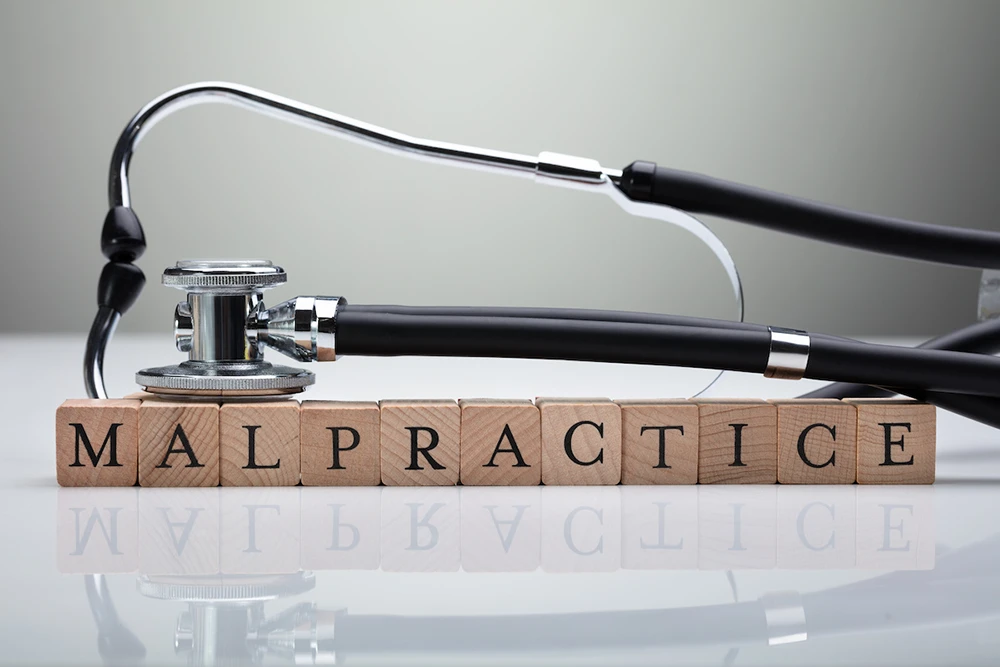The Difference Between Medical Malpractice vs. Negligence
By: Simon Law | February 19, 2024

Medical malpractice is a general term often used to describe any case where a doctor causes harm to a patient. While this is somewhat true, there are two types of cases an injured patient could bring against their doctor, depending on their individual facts. Medical malpractice cases are brought when there is the presence of ‘intent,’ whether obvious or discreet. Medical negligence cases are brought when there is no intent, but the act that caused harm is a mistake. In this post, we will break down the meanings of ‘intent’ and ‘mistake’ in medical malpractice vs. negligence litigation.
Duty of Care for Medical Professionals
The duty of care is a pivotal ethical and legal responsibility for medical professionals, representing their commitment to providing a standard of treatment consistent with prevailing norms. This obligation includes:
- Establishing a patient-provider relationship
- Delivering standardized care
- Prioritizing patient well-being
- Obtaining informed consent
- Ensuring continuity of care
In legal terms, the duty of care forms the basis for actions in medical negligence or malpractice cases. Compliance is crucial for maintaining professional licenses, as violations can lead to disciplinary actions.
What is Negligence?
Medical practitioners are held to a high standard due to the critical nature of their responsibilities. All types of employees make mistakes every day, but mistakes made by doctors can sometimes be fatal. Negligence is a legal concept arising when a healthcare professional fails to meet the standard of care expected in their field, resulting in harm or injury to the patient. Medical negligence claims do not rely on intent but rather on the act or omission considered a mistake by the doctor that causes injury or harm.
For the incident to be considered medical negligence, certain elements must be present, including:
- A breach of the duty of care owed by the healthcare provider to the patient
- A casual connection between the breach and the patient’s injury
- Identifiable damages suffered by the patient as a result of the mistake
Medical negligence cases often require expert testimony to establish the standard of care and demonstrate how it was not met in a particular situation.
Examples of Negligence in Medical Settings
There are various, diverse scenarios in which medical negligence can occur. Medical professionals have an obligation to maintain a high standard of care to ensure the well-being of their patients, but complacency can easily lead to these mistakes.
- Misdiagnosis or Delayed Diagnosis: A common form of medical negligence occurs when a healthcare provider fails to accurately diagnose a common medical condition or makes a late diagnosis that leads to complications or advanced disease progression.
- Surgical Errors: Negligence during surgical procedures can take various forms, such as operating on the wrong body part, leaving surgical instruments inside the patient, or performing unnecessary surgeries. Any of these errors in surgery can cause severe physical and emotional distress to the patient.
- Medication Errors: Administering the wrong medication, incorrect dosage, or failing to consider a patient’s allergies or potential drug interactions constitutes medical negligence. Making such medication errors adversely affect the patient’s health and well-being.
- Birth Injuries: Negligence during prenatal care or childbirth can lead to birth injuries, affecting both the mother and the newborn. Failure to promptly address complications or performing inadequate monitoring can result in long-term consequences.
- Lack of Informed Consent: Patients have the right to make informed decisions about their healthcare. It can be considered negligence when healthcare providers fail to adequately inform patients about the potential risks, benefits, and alternatives of a medical procedure or treatment.
- Failure to Follow Up: Medical negligence may also manifest in a healthcare provider’s failure to follow up with a patient after a procedure or treatment. The lack of continuity can lead to undetected complications or exacerbate existing health issues.
What is Medical Malpractice?
In medical malpractice cases, intent must be present, but it is not always the definition of ‘intent’ we may think of immediately. In this context, intent is defined as an act or omission that a doctor knew or should have known would cause harm to the patient. Medical malpractice can apply to the doctors, nurses, or other medical professionals involved in a patient’s case. Unlike negligence, malpractice pertains to the specific actions or omissions within the healthcare context that lead to the patient’s harm, injury, or death.
For an incident to be considered medical malpractice, certain criteria must be met, such as:
- Breach of duty of care owed by the healthcare professional to provide care
- A direct link between the breach and the patient’s injury
- Measurable damages suffered by the patient
Medical malpractice claims often involve a thorough investigation of medical records and require expert testimony to establish the deviation from the standard of care. Malicious intent is not required for a case to be tried as malpractice, but intent and failure to meet the standard of care are central to these claims.
Examples of Medical Malpractice
Adhering to high standards of care is critical to the medical profession to prevent harm and ensure patient well-being. Unfortunately, the actions of healthcare professionals can deviate from these standards, but medical malpractice claims aim to hold them accountable for these mistakes, whether they are a medical error at the hospital, an undiagnosed condition in the office, and more.
- Anesthesia Errors: Administering too much or too little anesthesia during a medical procedure can lead to serious complications, including brain damage or death. Proper monitoring and precise dosage administration are crucial to avoid malpractice in anesthesia.
- Failure to Obtain Informed Consent: Patients have the right to be fully informed about the risks, benefits, and alternatives before undergoing any medical intervention. Medical malpractice can occur when healthcare providers perform a procedure without obtaining informed consent from the patient.
- Failure to Diagnose or Delay a Diagnosis: If a healthcare professional fails to diagnose a medical condition in a timely manner, it can result in the progression of the disease and diminished chances of successful treatment, potentially constituting medical malpractice.
- Inadequate Follow-Up Care: After a medical procedure or treatment, healthcare providers must provide appropriate follow-up care to monitor the patient’s recovery. Failure to do so may lead to complications or the worsening of a patient’s condition, constituting medical malpractice.
- Improper Use of Medical Equipment: Healthcare professionals are expected to be proficient in handling medical equipment. Incorrect use of medical equipment, such as surgical tools or diagnostic devices, can lead to severe injuries.
- Obstetric Negligence: Medical malpractice in obstetrics can occur during prenatal care, labor, or delivery. Examples include failure to monitor fetal distress, improper use of forceps or vacuum extractors, and inadequate response to complications, resulting in birth injuries.
- Prescription Errors: Providing the wrong medication, incorrect dosage, or overlooking potential drug interactions can lead to serious harm. Prescription errors constitute medical malpractice and can have severe consequences for the patient.
Comparing Medical Malpractice and Medical Negligence
When looking at individual cases, the issue of negligence vs malpractice is key as both invite different elements that must be proven. While they share similarities, they differ in legal implications and specific contexts within the healthcare field.
Negligence is the broader concept, encompassing any deviation from the standard of care expected from a healthcare professional. Medical malpractice is a subset of negligence related to the professional’s actions or omissions from the accepted standard of care that resulted in harm. Malpractice cases have distinct legal requirements and considerations that go much deeper than negligence.
Similarities of Negligence and Malpractice
Medical negligence and malpractice share several commonalities and overlap in several ways within healthcare.
- Breach of Standard of Care: Both negligence and malpractice involve a breach of the standard of care expected from a healthcare professional. This breach signifies a failure to meet the established norms and practices within the medical community.
- Causation and Harm: In both cases, there must be a direct link between the healthcare professional’s actions or omissions and the harm the patient suffered. Establishing causation is crucial in demonstrating the negligence or medical malpractice directly led to the adverse outcome.
- Legal Action: In medical malpractice or negligence cases, patients can pursue legal action. Legal proceedings typically involve proving the breach of duty, causation, or damages suffered by the patient.
- Expert Testimony: Expert witnesses are crucial in both cases. They help establish the standard of care in the medical field, assess whether it was breached, and explain the connection between the breach and the harm.
Despite the similarities, medical malpractice has additional legal requirements to consider when establishing a specialized standard of care.
Key Differences: Negligence vs. Malpractice
The key difference between the two types of actions is the presence of intent. Because any medical malpractice case requires the intent element, the injured party must prove that their doctor knew or should have known the action would result in harm, which led to the standard of care being breached. For negligence cases, the injured party must only prove an unintended act or omission committed by the doctor resulted in harm.
There are also some other distinctions between the two:
Scope of Application
- Negligence: As a broader application, it can occur in various professional settings, not limited to healthcare.
- Malpractice: This is specific negligence that occurs within the healthcare field, involving the actions or omissions made by healthcare professionals.
Standard of Care
- Negligence: Involves a breach of the general standard of care expected in a given situation.
- Malpractice: Requires a breach of the specialized standard of care established through expert testimony within the medical community.
Legal Requirements
- Negligence: Generally requires proving the breach of duty, causation, and damages.
- Malpractice: Involves additional legal considerations, such as proving the specialized standard of care in the medical field.
Expert Testimony
- Negligence: Cases may involve expert testimony to establish the general standard of care.
- Malpractice: Requires expert witnesses to define and attest to the specialized standard of care in the medical field.
Consequences and Penalties
- Negligence: Consequences may vary depending on the industry, and penalties may not be as severe as in medical malpractice cases.
- Malpractice: Can lead to serious consequences, including legal actions, license revocation, and significant financial liabilities for healthcare professionals.
Legal Implications of Negligence vs. Malpractice
The legal implications of negligence and medical malpractice are profound, with significant consequences for healthcare professionals and affected patients. Understanding these implications is essential for navigating the complexities of legal proceedings and ensuring accountability in the healthcare industry.
In cases of negligence, the consequences may vary depending on the severity of the negligence and the industry involved, but it can lead to some common legal outcomes:
- Civil Liability: Individuals harmed by negligence have the right to pursue civil liability claims against the responsible party, resulting in possible compensation for suffered damages such as medical expenses, lost wages, and pain and suffering.
- Professional Repercussions: Healthcare professionals found negligent may face professional repercussions, including damage to their reputation, disciplinary actions by licensing boards, and potential limitations on their ability to practice in the future.
- Financial Consequences: Negligence claims can lead to financial liabilities for the responsible party, including payment of damages to the affected individuals.
With medical malpractice being a subset of negligence specific to the healthcare field, there are additional legal considerations when filing medical malpractice lawsuits. These legal implications may include:
- Complex Legal Proceedings: Medical malpractice cases often involve specialized legal proceedings. The need for expert witnesses to establish the specialized standard of care in the medical field adds a layer of complexity to these cases.
- Higher Stakes: The consequences of medical malpractice can be more severe than general medical negligence. In addition to civil liability, healthcare professionals may face criminal charges in extreme cases, especially if gross negligence or intentional misconduct is alleged.
- Professional License Revocation: Healthcare providers found guilty of medical malpractice may face the revocation or suspension of their professional licenses. A medical malpractice lawsuit can have a lasting impact on their careers and professional standing within the healthcare community.
- Insurance Premiums and Coverage: Medical malpractice claims can increase insurance premiums for healthcare professionals and institutions. Healthcare providers should maintain malpractice insurance to protect against potential financial burdens.
- Establishment of Precedent: Landmark medical malpractice cases can establish legal precedents that shape the standards of care in the medical community, underscoring the far-reaching impact of medical malpractice beyond individual cases.
Need to Claim Medical Malpractice or Negligence? Consult With the Simon Law Firm.
Whether your potential case is a malpractice or negligence claim should be left to expert attorneys in healthcare-related litigation. The negligence and medical malpractice attorneys at The Simon Law Firm, P.C. are ready to review the key facts of your case, determine whether it is a malpractice or negligence action, and litigate it to hold the doctor accountable for their actions on your behalf.
If you believe your or a loved one’s doctor has committed malpractice or medical negligence, contact The Simon Law Firm, P.C. today for a full, free case consultation.


